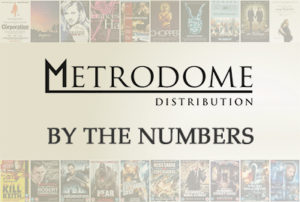 Last week, it was announced that UK distributor Metrodome has gone into administration. It’s sad news for their staff, the filmmakers they worked with, the exhibitors they supplied and for all UK cinema goers who enjoyed films outside of the mainstream.
Last week, it was announced that UK distributor Metrodome has gone into administration. It’s sad news for their staff, the filmmakers they worked with, the exhibitors they supplied and for all UK cinema goers who enjoyed films outside of the mainstream.
Since the news was announced, I have been contacted by a number of people who want to get a sense of the numbers behind Metrodome and their effect on the UK exhibition scene.
Metrodome’s balance sheet
For most of this article I’m going to focus on the films Metrodome released, but I thought I should start with a little financial information. In the twelve years for which Metrodome Group Limited filed annual accounts (i.e. 2003 to 2014), the company had revenues of £85,559,000. Despite this large turnover, the combined loss over this period came to £13,148,000.
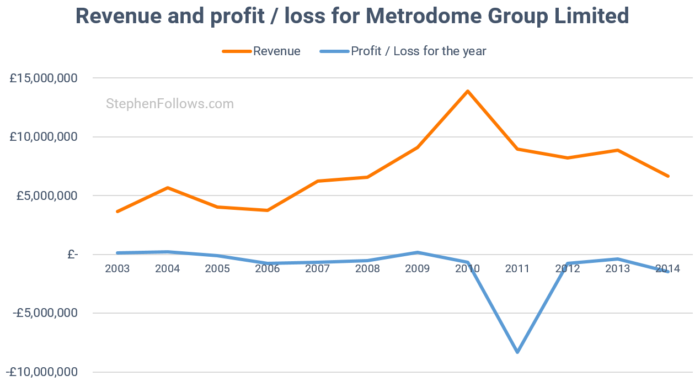
The huge loss in 2011 (£8.3 million) could be connected to their acquisition of Hollywood Classics in August 2011. That said, the company reported that they paid £1.6 million and so I suspect that there are other financial issues at play (such as writing off assets, etc). Frustratingly, their 2011 accounts are not available on their website, nor on the Companies House site. My limited knowledge of financial reporting combined with the missing document mean I can’t give a satisfactory answer at this stage (if anyone can make more sense of it than me, then please either email me or leave a comment below).
UPDATES: In the comments below, Roly has suggested that “the huge spike in sales in 2010 and the huge increase in losses in 2011 were due to the acquisition of Target Entertainments in August 2010 and its subsequent bankruptcy in 2012“. See more detail in their comment at the bottom of the article. Another contributor (who asked not to be named) suggested that it could be related to the loss they suffered following the demise of Woolworths. Woolworths was a major retailer in UK Home Entertainment, and although they closed their doors in early 2009, it could have taken time for the stock to be dealt with by the liquidators.
Metrodome’s theatrical releases
It’s surprisingly hard to build up an exact list of the films they distributed. I used a variety of sources to create a database of Metrodome films in the UK, but each source gave slightly different answers. For example, for the year 2016, IMDb lists 11 films on theatrical release, Box Office Mojo lists 12 and Rentrak (via the BFI) list 14. However, in the end, I found 225 feature films which Metrodome had brought to UK cinemas since 1995.
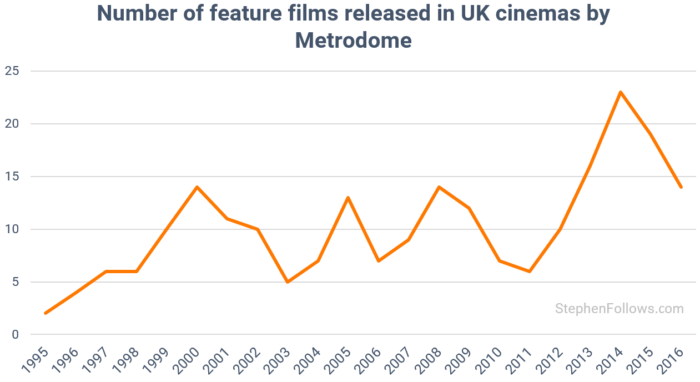
Across this time period, they grossed over £28.5 million, although their best years were over a decade ago. Their top grossing year was 2002, when they hauled in £3.4 million, thanks largely to Donnie Darko (£1.6 million) and Last Orders (£0.9 million).
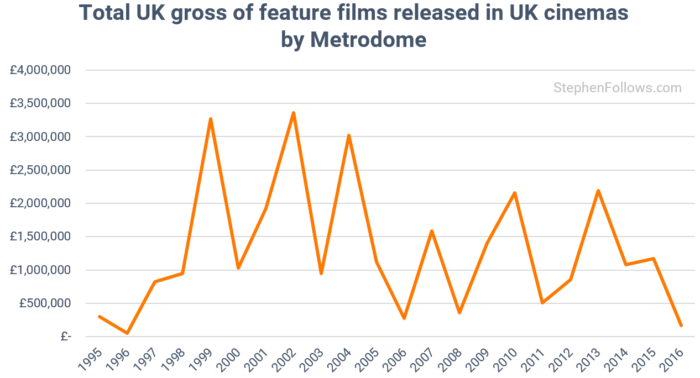
Their top grossing theatrical release was Monster (£2.5 million UK box office), followed by Human Traffic (£2.3 million), Donnie Darko and Last Orders. Despite these big hitters, most of Metrodome’s releases grossed far less.
41% of all their cinema releases grossed under £25,000, and only 5% earned over £0.5 million.
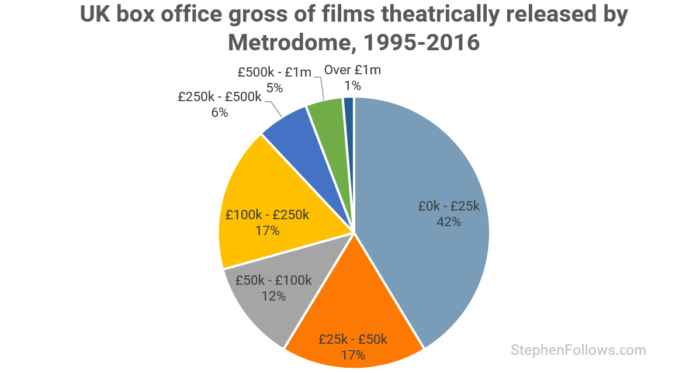
Most of their theatrical releases were very small, with almost half of all their films on appearing on fewer than ten screens.
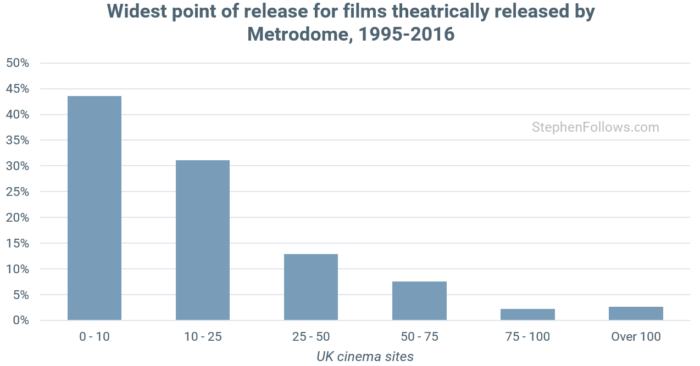
Between 2012 and 2016, they received almost £1 million from the BFI to support the distribution of ten of their titles.
| Project title | Award | Fund | Type | Date |
|---|---|---|---|---|
| The Hard Stop | £22,886 | Distribution Fund | New Models | 08/06/16 |
| Sunset Song | £170,642 | Distribution Fund | Breakout | 07/10/15 |
| Eden | £101,394 | Distribution Fund | Breakout | 03/06/15 |
| The Falling | £91,000 | Distribution Fund | Breakout | 25/02/15 |
| The Grandmaster | £90,500 | Distribution Fund | Breakout | 25/09/14 |
| We Are the Best! | £94,875 | Distribution Fund | Breakout | 05/02/14 |
| Frances Ha | £47,797 | Distribution Fund | New Models | 19/06/13 |
| Summer In February | £159,964 | Distribution Fund | Breakout | 10/04/13 |
| A Royal Affair | £123,911 | Prints and Advertising Fund | Specialised P&A | 02/05/12 |
| In Darkness | £76,675 | Prints and Advertising Fund | Specialised P&A | 08/02/12 |
Metrodome’s Home Entertainment releases
The Metrodome site lists 433 titles they brought to the UK Home Entertainment sector (i.e. DVD, Blu-Ray and VOD).
182 of their releases give their release date as 1st January 2009, which I have taken to be the default on their system rather than a very busy New Year. However, the dates from 2011 seem correct, which reveal that 2012 was their strongest year, with a total of 59 Home Entertainment releases.
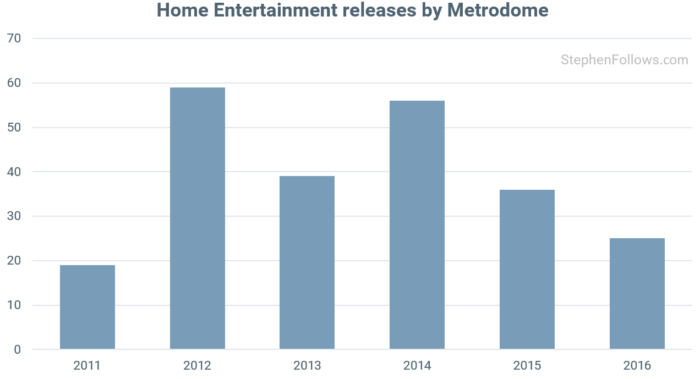
Horror is the most popular genre, followed closely by Action.
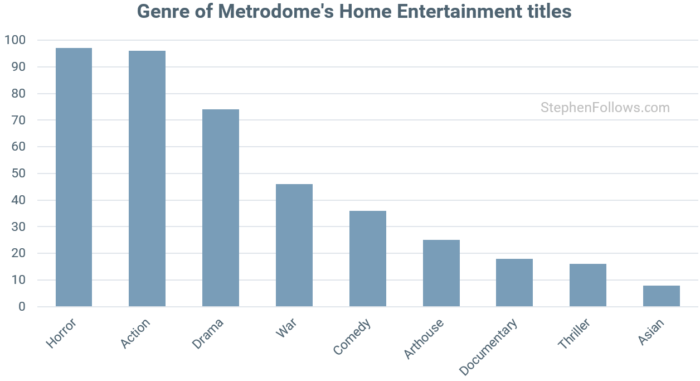
A tale of two distributors
Looking at the titles Metrodome released, we can see two different strategies at play. In cinemas, they released a large number of high quality, arthouse films…

…whereas their Home Entertainment line-up was a bit more… erm… shlocky.

In the past few years, Metrodome seems to have taken lessons from their Home Entertainment success and started to increase the number of horror releases in their theatrical slate.
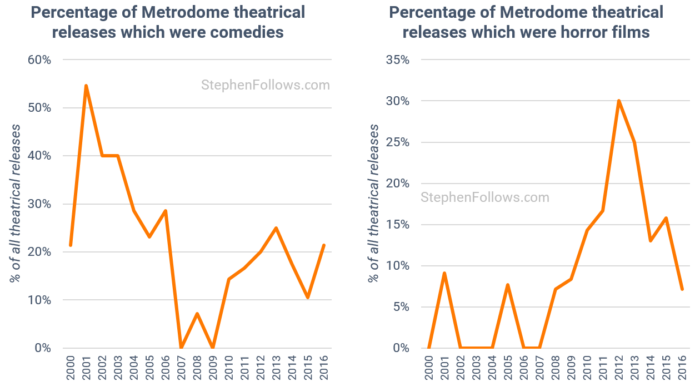
As of the time of writing, there is little information about why the company folded so it would be improper to speculate. Right now we can only hope that their titles get transferred to another good distributor and their staff find new jobs quickly.
If, in the fullness of time, more info is released about what caused their demise then I may revisit the topic to look at what the numbers can reveal.
Notes
As mentioned above, I used a number of sources to build up a picture of Metrodome’s influence on the UK cinema scene. This was far from straightforward as each source gave a different answer. This could be due to the fact that the kinds of films Metrodome often distributed are also those that typically have poor reporting. I have often heard stories from independent filmmakers that the “official” box office number released by Rentrak under-reported the data for their small release. This is because Rentrak covers a huge number of the UK’s screens but not all. And the ones they miss are usually small and independent cinemas, i.e. those more prone to show indie films.
The genre classification used for the theatrical releases come from IMDb, which assigned up to three genres per film. By contrast, the genre classification used for the Home Entertainment releases was from the Metrodome site, which only assigned one genre per film. Therefore, the two numbers are not directly comparable.
All 2016 figures cover the period from 1st January 2016 until 15th August 2016.

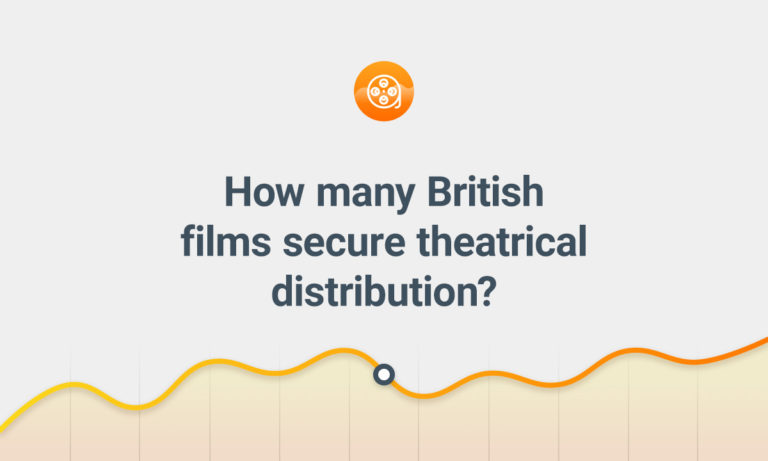



Comments
How dare you refer to “Kill Keith” as “schlocky”. It’s a tour de force of a film!
In 2009 my friend Elliott Kastner… a film producer… asked me to give him an assessment about buying Hollywood Classics. I produced a small paper that said it would be a disaster and that he should not touch it unless he could secure digital rights of these films… which at the time he could not.
The huge spike in sales in 2010 and the huge increase in losses in 2011 were due to the acquisition of Target Entertainments in August 2010 and its subsequent bankruptcy in 2012. The 2010 sales increase (over 4 million pounds) only result in a net profit increase of 193k. Nevertheless, the 2010 accounts are full of hopeful statements about the impact of the acquisition of Target on future revenues and profit…
…only to see from the 2012 accounts that Target was placed into administration in February 2012. The 2012 accounts show the comparative figures for 2011, so we can get some kind of a picture, and I quote:
“Under applicable accounting standards we were required to impair the assets in 2011 and remove the liabilities from the consolidation in 2012, which resulted in a profit from discontinued operations for the year of £5,196,000 (2011: loss of £8,733,000).”: so, a net loss of 3.6 million on the closure of Target over these two accounting years? Yeesh. Not a sound way to invest 800k quid just 18 months previously.
This is on top of the underlying fact that the company never really made any money from its core business,.
Managed to track down the 2011 accounts: http://www.distribution.metrodomegroup.com/download/Annual_Report_and_Accounts_2011.pdf
Goes into more detail about the discontinuation of Target and subsequent impairment of assets – I can see why they don’t make this easily available on their website
While a company with no track record of making profits does not look promising in the long run, it may be useful to consider why Metrodome went into administration now at just this time. The vast majority of businesses going into administration do so, not because of a lack of profits, but because of deficiencies in their working capital management. Their accounts depict an organisation that operated on low cash reserves. What were they doing to address this? What could they do?
Were they getting the basics right, like ensuring that exhibitors were being billed promptly and following this up with appropriate credit control? Anecdotally, I am aware that there may have been issues here which would not have helped their situation. While I am aware of just a few examples, it does not take too much of a stretch to multiply this out across many, many more customers and exhibitors.
Would tightening up here have helped? I cannot say, it couldn’t have hurt, but it is a sobering lesson for all running businesses in this industry. Get the basics right!
For the record, their December 2014 accounts were not filed until March 2016 – in itself, a very obvious warning sign. Within these, the auditors include within their report an “emphasis of matter” disclosure which highlighted significant doubt about Metrodome’s ability to continue as a going concern.
My primary thought though is just that this is sad news. I wish everyone affected well.